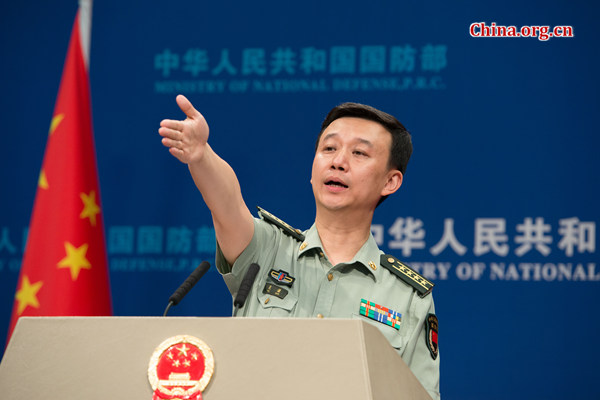PLA demands India withdraw intruding troops
|
|
|
Senior Colonel Wu Qian, spokesman for the Ministry of National Defense of China, responds to media questions on June 29, 2017, at a routine press briefing in Beijing. [Photo by Chen Boyuan/China.org.cn] |
The Ministry of National Defense (MOD) has once again demanded India remove troops trespassing across the border in the Sikkim section and obstructing Chinese border guards’ normal activities.
Senior Colonel Wu Qian, spokesperson for the MOD, told a press conference on June 29 that Indian border guards had crossed the border into Chinese territory. He accused the Indian troops of obstructing People’s Liberation Army (PLA) normal activities in the Donglang area.
“Our border guards have taken necessary measures in response and they will resolutely preserve the country’s sovereignty and territorial integrity,” he said.
His remark amounted to a reiteration from the PLA demanding India halt its encroachments. Earlier on June 26, Colonel Ren Guoqiang, another MOD spokesman, warned India not to obstruct PLA road construction in the Donglang area. The Chinese Ministry of Foreign Affairs made similar representations to India.
Some Indian media claimed that it was Chinese soldiers that trespassed onto the Indian side before they used bulldozers to dismantle some facilities.
Wu justified the PLA’s road construction, stressing that “the incident took place on Chinese territory.”
“We have explicitly demand India correct its errors immediately and withdraw its personnel that illegally crossed the Chinese border,” he said.
At the same time, the MOD spokesman criticized Indian Army Chief Bipin Rawat over his statements of preparations for a multi-front war.
General Bipin Rawat recently said, “Indian Army is fully ready for a two-and-a-half front war.”
Deeming such remarks “extremely irresponsible,” Wu urged certain people in the Indian military to “learn from the history and stop airing such dangerous, belligerent remarks.”
A video made public shows that a new type of PLA tanks recently appeared on the Tibetan plateau for exercises. Military observers noticed it was the 35-ton light main battle tank and its barrel was adjusted to a higher position to cope with mountain warfare.
Recent U.S. media reports claimed this tank featured an even stronger front protection than the PLA’s latest 96A tank, far exceeding the Indian army’s 90S tanks.
The MOD spokesperson confirmed that PLA’s new tanks were being tested in a high-altitude environment in Tibet. However, he rebuffed allegations that linked the tank with recent border tensions with India, saying the tests targeted no country.
read more

